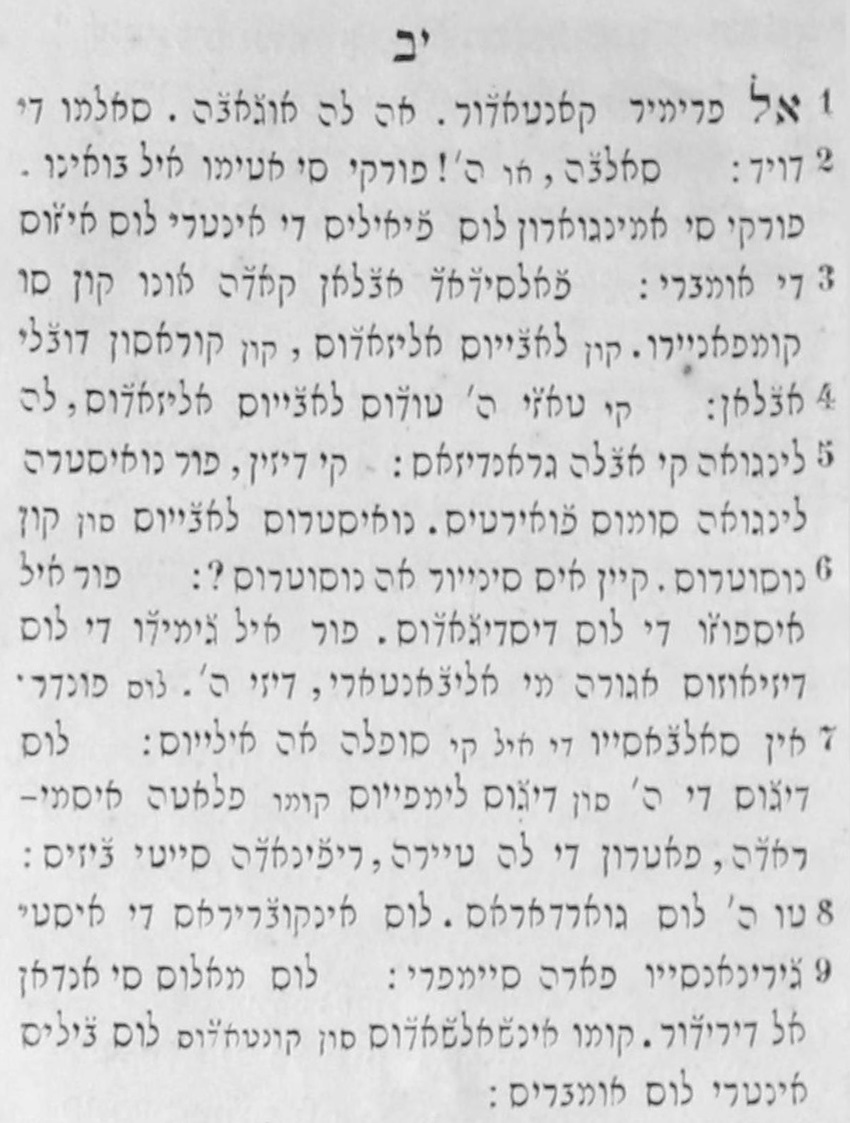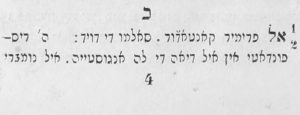| Source (Hebrew) | Translation (Ladino) | Transliteration (Romanized Ladino) |
|---|---|---|
א לַמְנַצֵּ֗חַ מִזְמ֥וֹר לְדָוִֽד׃ |
1 אל פרימיר קאנטאדﬞור. סאלמו די דויד. |
1 El Primer Cantador. Salmo de David. |
ב יַֽעַנְךָ֣ יְ֭הוָה בְּי֣וֹם צָרָ֑ה יְ֝שַׂגֶּבְךָ֗ שֵׁ֤ם ׀ אֱלֹהֵ֬י יַעֲקֹֽב׃ |
2 ה׳ ריספונדאטי אין איל דיאה די לה אנגוסטייה. איל נומברי דיל דייו די יעקב טי אינאלטיסקה: |
2 HASHEM respóndete en el día de la angustia. El nombre del Dio de Ya’aqoḅ te enaltezca. |
ג יִשְׁלַֽח־עֶזְרְךָ֥ מִקֹּ֑דֶשׁ וּ֝מִצִּיּ֗וֹן יִסְעָדֶֽךָּ׃ |
3 איל מאנדי דיל סאנטובﬞארייו טו אייודﬞה. אי טי אסופﬞרה די ציון: |
3 Él mande del santovário tu ayuda. Y te esufra[1] Spanish=sostenga; English=sustain. de Tziyón. |
ד יִזְכֹּ֥ר כָּל־מִנְחֹתֶ֑ךָ וְעוֹלָתְךָ֖ יְדַשְּׁנֶ֣ה סֶֽלָה׃ |
4 טינגה אין מימורייה טודﬞוס טוס פריזינטיס, אי ריסיבﬞה פור גרואיסה טו אלסאסייון. סלה: | |
ה יִֽתֶּן־לְךָ֥ כִלְבָבֶ֑ךָ וְֽכָל־עֲצָתְךָ֥ יְמַלֵּֽא׃ |
5 טי די סיגון איל דיזיאו די טו קוראסון. אי טודﬞו טו קונסיזﬞו קומפלה: |
5 Te da según el deseo de tu corazón. Y todo tu concizo cumpliá. |
ו נְרַנְּנָ֤ה ׀ בִּ֘ישׁ֤וּעָתֶ֗ךָ וּבְשֵֽׁם־אֱלֹהֵ֥ינוּ נִדְגֹּ֑ל יְמַלֵּ֥א יְ֝הוָ֗ה כָּל־מִשְׁאֲלוֹתֶֽיךָ׃ |
6 קאנטארימוס די טו סאלבﬞאסייון. אי אין איל נומברי די נואיסטרו דייו ליבﬞאנטארימוס איל פינדון. ה׳ קומפלה טודﬞאס טוס דימאנדאס׃ |
6 Cantaremos de tu salvación. Y en el nombre de nuestro Dio levantaremos el pinedon.[5] Unknown. Possible derived from the word meaing pin or emblem. Spanish=pabello, bandera; English: banner, flag HASHEM compla todas tus demandes. |
ז עַתָּ֤ה יָדַ֗עְתִּי כִּ֤י הוֹשִׁ֥יעַ ׀ יְהוָ֗ה מְשִׁ֫יח֥וֹ יַ֭עֲנֵהוּ מִשְּׁמֵ֣י קָדְשׁ֑וֹ בִּ֝גְבֻר֗וֹת יֵ֣שַׁע יְמִינֽוֹ׃ |
7 אגורה ייו סי קי ה׳ סאלבﬞה אה סו אונטאדﬞו. לי ריספונדירה די סוס סאנטוס סיילוס פור לאס באראגאניאס די לה סאלבﬞאסיון די בﬞייני די סו דיריגﬞה: | |
ח אֵ֣לֶּה בָ֭רֶכֶב וְאֵ֣לֶּה בַסּוּסִ֑ים וַאֲנַ֓חְנוּ ׀ בְּשֵׁם־יְהוָ֖ה אֱלֹהֵ֣ינוּ נַזְכִּֽיר׃ |
8 איסטוס אינמינטאן קואטריגואס, אי איסטוס קאבﬞאלייוס. מה נוסוטרוס אינמינטאמוס איל נומברי די ה׳ נואיסטרו דייו: |
8 Estos enmitan quatriguas,[8] Spanish=carros de combate, carrozas de guerra; English=chariots. In classic antiquity and the Roman Empire, quadrigae were cars or chariots drawn by four horses abreast and favored for chariot racing. The word derives from the Latin quadrigae, a contraction of quadriiugae, from quadri-: four, and iugum: yoke. In Latin the word quadrigae is almost always used in the plural and usually refers to the team of four horses rather than the chariot they pull; this is attested to by Roman author and grammarian Aulus Gellius (lived from circa 125 to 180 CE) who documented that Julius Caesar considered it incorrect to use the word in the singular (see Noctes Atticae 19.8). In Greek, a four-horse chariot was known as τέθριππον téthrippon. y estos caballos. Me nosotros enmintamos el nobre de HASHEM nuestro Dio. |
ט הֵ֭מָּה כָּרְע֣וּ וְנָפָ֑לוּ וַאֲנַ֥חְנוּ קַּ֝֗מְנוּ וַנִּתְעוֹדָֽד׃ |
9 אילייוס סי ארודﬞילייארון אי קאיירון. מה נוסוטרוס נוס ליבﬞאנטאמוס אי נוס אדﬞיריזאמוס: |
9 Ellos si arodillaron y cayeron. Me nosotros nos levantamos y nos adrizamos. |
י יְהוָ֥ה הוֹשִׁ֑יעָה הַ֝מֶּ֗לֶךְ יַעֲנֵ֥נוּ בְיוֹם־קָרְאֵֽנוּ׃ |
10 ה׳ סאלבﬞה! איל ריי נוס ריספונדה אין איל דיאה קי לייאמארימוס אה איל: |
10 HASHEM salva! El Rey nos responda en día que le llamaremos á El. |
To the best of my ability, this is a faithful transcription of Psalms 20 from תהילים או לוס סאלמוס ; טריסלאד’אד’וס דיל לשון הקדש אין לה לינגואה ספרדית (Tehillim, or the Psalms, translated from the Holy language [Hebrew] into the Sephardic language, Estampado por Ǧ. Griffit 1852/3) from a digital copy made available by the collection of Sephardic Studies at the University of Washington. The Romanized Ladino was offered by Shmuel Gonzales according to the transliteration schema of Dr. Lazar. –Aharon N. Varady
Psalms 20 is traditionally recited in times of stress, especially during childbirth.
Psalms 20 is recited in its entirety as part of the daily shaḥarit service, between Ashrei and Uva Letziyon (at the end of shaḥarit). Psalms 20:2 and Psalms 20:10 are part of the opening paragraph of the long Tachanun recited on Mondays and Thursdays. Psalms 20:10 is also the 11th verse of V’hu Raḥum and the final verse of Yehi Kavod in Pesukei Dezimra; it is included in Uva Letzion; it is the second of two verses recited as an introduction at Maariv; and it is part of series of verses introducing the Havdalah for Shabbat.
The special Ladino diacritic appearing over some of the letters (e.g., שﬞ) is called a varika.
Transcription Source

Notes
| 1 | Spanish=sostenga; English=sustain. |
|---|---|
| 2 | English=sacrifice, meal offerings; possibly derived from Latin, meaning “perish” |
| 3 | Old Spanish for grasa; in English=fat. |
| 4 | Spanish=ofrenda, sacrificio; English=offering. Latin=holocaustum. |
| 5 | Unknown. Possible derived from the word meaing pin or emblem. Spanish=pabello, bandera; English: banner, flag |
| 6 | Spanish=ungido; English=anointed. |
| 7 | Unknown |
| 8 | Spanish=carros de combate, carrozas de guerra; English=chariots. In classic antiquity and the Roman Empire, quadrigae were cars or chariots drawn by four horses abreast and favored for chariot racing. The word derives from the Latin quadrigae, a contraction of quadriiugae, from quadri-: four, and iugum: yoke. In Latin the word quadrigae is almost always used in the plural and usually refers to the team of four horses rather than the chariot they pull; this is attested to by Roman author and grammarian Aulus Gellius (lived from circa 125 to 180 CE) who documented that Julius Caesar considered it incorrect to use the word in the singular (see Noctes Atticae 19.8). In Greek, a four-horse chariot was known as τέθριππον téthrippon. |

“תהלים כ׳ בלשון לאדינו | Psalms 20 by David in Ladino (Estampado por Ǧ. Griffit, ca. 1852/3)” is shared through the Open Siddur Project with a Creative Commons Attribution-ShareAlike 4.0 International copyleft license.










Comments, Corrections, and Queries